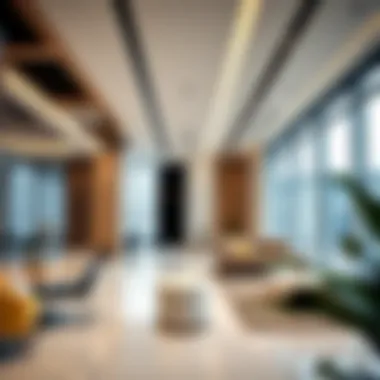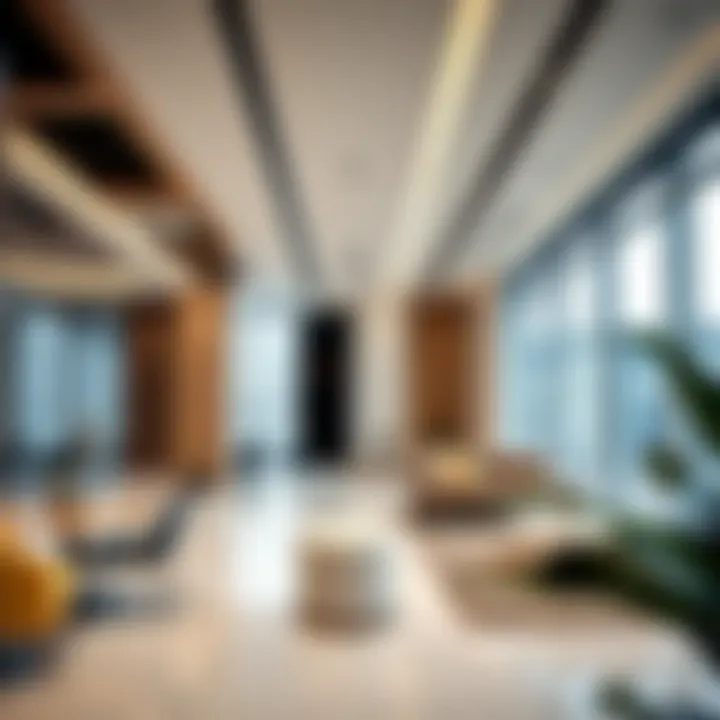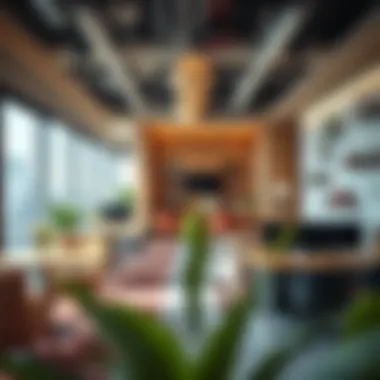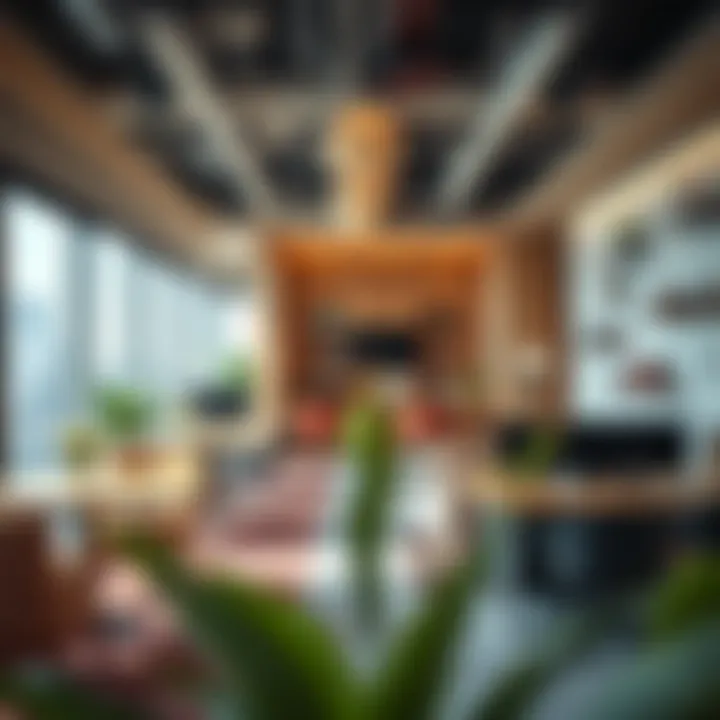Understanding Dubai's Office Space Market Dynamics


Intro
In the bustling metropolis of Dubai, the landscape of office spaces is not just a reflection of architectural ambition but also a testament to the city's economic vigor and strategic positioning in the global market. Over the last couple of decades, as Dubai ascended the ranks of global business hubs, the demand for quality office spaces has surged. This surge hasn't come without its own set of challenges, making it imperative for businesses, investors, and real estate agents to stay informed regarding the nuances of this complex market.
The focus here is to delve into the multifaceted world of office spaces in Dubai, dissecting the market trends, investment avenues, and the regulatory environment that governs this sector. The vast range of options available—from swanky skyscrapers in Downtown Dubai to more suburban settings—cater to a variety of businesses seeking productive environments. Moreover, understanding the shifting needs and preferences in workspace design is vital as companies adjust to newer work paradigms, especially post-pandemic.
As we embark on this exploration, the insights gained can prove pivotal for those contemplating entering this dynamic market or enhancing their current real estate portfolios. Without further ado, let's dive into the unfolding narrative of Dubai's office spaces.
Understanding the Commercial Landscape of Dubai
Understanding the commercial landscape of Dubai is crucial for anyone looking to navigate the complexities of its office space market. Situated at the crossroads of Europe, Asia, and Africa, Dubai serves as a thriving hub for business and trade. Ripe with opportunities and challenges, the city's office space ecosystem reflects its ambitious economic vision and robust growth trajectory.
As we explore this topic, several elements come into play: from economic indicators to the motivations behind business establishment. Recognizing these can help investors, professionals, and entrepreneurs make informed decisions that align with the city's dynamic environment.
As the saying goes, "A rising tide lifts all boats." This adage holds particularly true for Dubai. The ongoing infrastructure developments, such as the expansion of the Dubai Metro system and the renovation of iconic structures, create an attractive backdrop for new and existing businesses alike. These enhancements are designed not only to facilitate smoother logistics but also to augment the overall appeal of Dubai as a commercial epicenter.
Economic Indicators and Growth Trends
Economic indicators serve as the heartbeat of Dubai's commercial landscape. The city boasts a notable GDP growth rate, driven by its diversified economy spanning tourism, finance, logistics, and technology. Despite fluctuations in oil prices globally, Dubai's shift towards sectors such as information technology and renewable energy underscores its resilience and adaptability. In fact, according to recent statistics,
- The GDP growth rate was recorded at around 4.5% last year.
- The non-oil sector accounted for roughly 70% of the emirate's economy.
This stability attracts foreign investors who see Dubai not just as a place to do business, but as a growing market with significant potential returns.
From real estate to workflow design, decisions are informed by these burgeoning growth trends. Businesses can assess how their office space choices align with broader economic patterns. For example, emerging tech companies may opt for co-working environments that foster collaboration, while established firms may prefer traditional offices that signify stability.
In this context, monitoring key indicators like employment rates, cost of living, and real estate trends become vital. Understanding these nuances fosters a clearer perspective on how businesses can find success amidst the evolving commercial terrain.
Incentives for Business Establishment
Dubai has developed a tapestry of incentives to attract companies seeking a foothold in the region. The goals are straightforward: stimulate economic growth and elevate the emirate’s status as a global business hub.
- Free Zones: A hallmark of Dubai's strategy, free zones provide beneficial frameworks for startups and established companies. They offer 100% foreign ownership, zero personal income taxes, and minimal customs duties, helping entrepreneurs retain more of their earnings. Companies like the Dubai Multi Commodities Centre (DMCC) have drawn numerous businesses, significantly boosting economic activity within their zones.
- Streamlined Registration Processes: The emirate has made remarkable strides in simplifying company registration processes. Efforts to digitize government services result in quicker approvals and a transparent business climate, attracting even more businesses.
- Funding Opportunities: Available grants and support programs can be the cherry on top for any budding enterprise. For instance, entities like Dubai SME provide financing support and mentoring for small and medium-sized enterprises, bolstering the entrepreneurial spirit.
These incentives not only reflect Dubai's business-friendly ethos but also contribute to fostering an environment conducive to innovation and growth. As businesses evaluate opportunities, understanding these factors could prove pivotal in deciding the suitability of office space and its potential impact on operations.
"In Dubai, the opportunities are as diverse as the people it attracts from all corners of the globe."
Thus, grasping the commercial landscape of Dubai is not merely an exercise in analysis; it’s an essential step toward strategically positioning oneself in a market that brims with possibilities.
Types of Office Spaces Available
The landscape of office spaces in Dubai is as diverse as the city's rapid evolution. Understanding the various types available is crucial for businesses and investors alike. This section highlights the significance of different office solutions — namely Co-Working Spaces, Traditional Offices, Serviced Offices, and Flex Offices — that cater to the pressing needs of a dynamic corporate environment.
Co-Working Spaces
Co-working spaces have surged in popularity, creating a community of independent professionals and small businesses under one roof. These spaces not only offer flexibility but also foster networking opportunities. Expect to find amenities like high-speed internet, meeting rooms, and lounge areas, making them appealing for startups and freelancers.
The cost structure generally leans towards agility too; monthly memberships typically outshine long-term leases in terms of affordability. As one might say, "Why put all your eggs in one basket?" This type of space allows businesses to scale according to their needs without the hefty overheads of traditional rentals.
Traditional Offices
Traditional offices provide a sense of permanence and structure for many businesses. They are often leased long-term, offering an entire floor or building to a single company. This arrangement allows for brand identity reinforcement, a dedicated space for employees, and the ability to customize the environment according to the company’s culture.
However, these spaces can come with hefty price tags and limited flexibility. If your business isn't looking to make a long-term commitment, you might find it difficult to navigate the commitments and obligations that traditional contracts entail. If you're considering this option, it’s important to weigh both the stability it offers against the risk of being stuck in a lease during market downturns.
Serviced Offices
Serviced offices strike a balance between flexibility and functionality. Fully furnished and equipped with essential services ranging from reception help to IT support, these spaces cater to a variety of business sizes. This solution is particularly appealing for companies seeking a professional image without the burdens of setup or maintenance.
When pondering a serviced office, keep in mind the costs can vary significantly based on location and amenities. Some consider them a tad higher than co-working spaces, yet many find that the time and effort saved justify the expense. In the fast-paced market of Dubai, having a ready-to-go workspace can make all the difference.


Flex Offices
Flex offices are designed to adapt along with your business needs, offering short-term contracts and a range of configurations. This flexibility helps businesses to expand or contract as necessary. For example, an organization that’s scaling its workforce can easily increase its office space without the long-term commitment typically tied to a traditional set-up.
With collaborative environments and integrated technology, flex offices embody modern work culture. They often include open layouts, giving employees room to collaborate and innovate. If you find yourself in a rapidly changing business landscape, consider how this adaptability could benefit you.
"It's not just about having space; it's about having a space that works for your needs."
In summary, the types of office spaces available in Dubai cater to diverse needs, offering benefits that suit every business model. As the city continues to grow and change, understanding your options can help invest wisely in your commercial presence.
Location Considerations for Office Spaces
Understanding the location dynamics in Dubai's office landscape is crucial for businesses aiming to establish a foothold in this bustling city. The right location not only enhances visibility and accessibility but also influences operational efficiency and company image. Various factors come into play when selecting an office location; these can significantly impact a business's success.
Choosing a strategic site is akin to placing the final puzzle piece in an intricate picture. It can add value to a company, affecting hiring potential, client interactions, and even branding.
For investors and business owners alike, being acquainted with the location possibilities gives a competitive edge. It helps identify potential hotspots, where the demand for office spaces is on the rise.
Central Business Districts and Their Appeal
Central Business Districts (CBDs) in Dubai, such as the Dubai International Financial Centre, are the beating heart of the city's corporate world. This area radiates a certain magnetism; it’s where business leaders mingle, and decisions are made. The appeal of these districts lies not just in their prestige but also in their myriad amenities that cater to professionals.
- Networking Opportunities: Being surrounded by industry leaders offers a distinct advantage as networking naturally happens in this atmosphere.
- Infrastructure: Well-established infrastructure ensures that everything from logistics to personnel movement runs smoothly.
- Talent Pool: CBDs attract a skilled workforce, making hiring easier for companies looking to boost their teams.
"The CBD is a microcosm of what Dubai represents; opportunity and innovation at every corner."
Choosing office space within a central district often signals a business’s ambition, aiding not just in operations but also in recruiting top talent eager to work at a prestigious address.
Emerging Neighborhoods
While the CBDs have their charm, emerging neighborhoods in Dubai present a different kind of allure. Areas such as Al Quoz and Dubai Studio City are blossoming with potential. These neighborhoods may not yet have the same prestige as the established zones, but they offer unique advantages worth considering:
- Affordability: Rental prices are generally lower, making it easier for startups to manage cash flow.
- Creative Atmosphere: Many of these neighborhoods foster a sense of community among entrepreneurs and creative business ventures, leading to innovative collaborations.
- Future Growth: Many of these areas are under development, so establishing a presence early can lead to significant long-term advantages as they transform into sought-after locales.
Companies keen on innovation might find that being surrounded by creative and like-minded businesses provides invaluable synergies that can propel their growth exponentially.
Accessibility and Transportation Links
A solid transport network can often make or break the decision on where to set up shop. Dubai boasts a vast array of transportation options that facilitate ease of access. The presence of the Metro, extensive road networks, and proximity to major airports can greatly enhance a location's allure:
- Metro Accessibility: Locations near metro stations provide employees with convenient commuting options, reducing travel time and boosting morale.
- Public Transport Integration: Buses and taxis that are frequently available further augment accessibility, catering to both workforce and clients.
- Proximity to Airports: Businesses engaged in international dealings benefit greatly from being close to Dubai International or Al Maktoum International airports.
In essence, the choice of location in Dubai's office landscape is far more than an aesthetic decision; it’s a strategic one that encompasses a multitude of aspects impacting both daily operations and long-term success. By understanding these location considerations, businesses can navigate this complex landscape more effectively, leading to more informed decisions.
Regulations Governing Office Spaces
The landscape of office spaces in Dubai is intricately tied to a framework of regulations that ensures order and fairness in the market. Understanding these regulations is vital for anyone looking to invest or establish their business in the UAE. They provide a roadmap, outlining the expectations for business operations, tenant and landlord rights, and even the overall global perception of Dubai’s economic stability.
Licensing Requirements
In the United Arab Emirates, obtaining the proper licensing is not just a bureaucratic hurdle; it’s essential for lawful operation. Businesses must first establish a local sponsorship or partnership if they wish to set up in the mainland. The specific licenses needed often depend on the type of business activity. For instance, a company focused on consultancy might require a different license than a trading business.
The process involves submitting necessary documents like a business plan, passport copies of the investors, and proof of funds. It's important to know that the Dubai Economic Department (DED) regulates licensing, and the nature of your office space—be it co-working or a traditional office—can impact the required licensing. Failure to secure a license can result in fines or a complete ban on business operations, thus building a strong case for thorough research and adherence.
Compliance with Health and Safety Standards
Health and safety regulations in Dubai are stringent for a reason. They are designed to protect not just the employees, but also customers and the community at large. For office spaces, compliance entails everything from fire safety measures to ensuring adequate ventilation in work areas. Businesses must often engage with the Dubai Municipality to ensure they meet these requirements, which can sometimes feel like navigating a maze of protocols.
"Ensuring compliance with health and safety standards is not just an obligation, but also contributes to a company’s reputation and employee morale."
Companies need to conduct routine checks and make any necessary modifications to their physical space. Additionally, under the guidance of the Ministry of Health and Prevention, offices are required to adhere to various health codes which can affect everything from workspace layout to the amenities offered in break areas.
Zoning Laws and Their Impact


Zoning laws dictate how land can be used in Dubai, and they play a crucial role in determining where businesses can set up their offices. These laws help regulate different areas, designating them for commercial, industrial, or residential use. Understanding zoning laws can mean the difference between a flourishing business and a logistical nightmare.
On one hand, commercial zones generally provide better access to transport links and foot traffic, which can amplify business prospects. On the other hand, zoning laws can also limit the expansion of businesses. For example, if a business wishes to relocate or expand into a different area, they must comply with the zoning regulations of that district.
Furthermore, some areas have developed specific incentives for businesses that align with Dubai's growth strategies, particularly sectors like technology and renewable energy. Failing to navigate zoning correctly can cause significant delays, and in some instances, can halt operations altogether.
By keeping these regulations in consideration, investors can better position themselves for success while mitigating potential pitfalls along the way.
Market Trends and Preferences
Understanding market trends and preferences in regard to office spaces in Dubai is crucial. The dynamics of this vibrant city make it a focal point where businesses not only want to establish their presence but also thrive. Recognizing the shifts in workplace design, the evolving hybrid work models, and the growing emphasis on sustainability can significantly influence decision-making for investors, developers, and tenants alike. These trends are not merely superficial shifts but represent the changing priorities and desires of modern businesses and their workforce. As companies look to create environments that foster productivity and well-being, adhering to these trends becomes a strategic imperative.
Shifts in Workplace Design
In Dubai, office design is undergoing a transformation aimed at enhancing employee engagement and fostering creativity. Gone are the days of sterile cubicles that stifle innovation. Today’s offices embrace open spaces, natural light, and collaborative areas. This shift is not just aesthetic; it carries practical implications. With designs that promote interaction, companies ensure that their teams communicate more effectively, leading to increased collaboration between departments.
Furthermore, incorporating elements like biophilic design has gained traction. This concept integrates natural elements into the built environment, which can have a positive effect on employee well-being. Features such as living walls or green open spaces cultivate an atmosphere that promotes mental health and productivity.
- Key Design Elements:
- Open floor plans to encourage collaboration.
- Use of natural materials and colors.
- Incorporating flexible spaces for various work styles.
As office spaces evolve, developers who recognize this trend can position their offerings as attractive to prospective tenants.
The Rise of Hybrid Work Models
The hybrid work model has emerged as more than just a temporary response to global events; it is rapidly becoming a staple in office culture. Many companies are adopting this model as it combines remote work with in-office presence, giving employees flexibility while maintaining organizational connectedness. In Dubai, where a diverse workforce seeks balance, the hybrid model offers an appealing solution.
With the growth of this trend, office spaces need to adapt. Businesses are looking for environments that can cater to varied working styles, including quiet spaces for focused work and collaborative hubs for team meetings. This necessitates a design that is not only functional but versatile.
- Benefits of Hybrid Models:
- Increased employee satisfaction and retention rates.
- Greater productivity as employees can choose their optimal work environments.
- Potential reductions in operational costs for businesses, as office space usage becomes more efficient.
In response to this trend, landlords and property developers must curate spaces that support such flexibility, ensuring they remain competitive.
Sustainability in Office Spaces
Sustainability isn’t just a trend; it’s becoming a necessity in the commercial real estate market. In Dubai, where environmental considerations are increasingly prioritized, green building initiatives are at the forefront. The integration of sustainable practices in office design not only aligns with global environmental goals but also offers financial incentives for developers and tenants.
From energy-efficient appliances to sustainable materials, office spaces that embrace these practices often see a reduction in energy costs and an enhanced corporate image. Moreover, many businesses are now actively seeking out green certifications for their premises, which can be a significant factor in attracting clients and talent who share similar values.
- Sustainable Practices:
- Use of renewable energy sources.
- Water-saving fixtures and systems.
- Efficient waste management and recycling programs.
"The future of office spaces in Dubai hinges on understanding these key trends, as businesses aim to not only survive but excel in this competitive environment."
Investment Opportunities in Dubai Office Spaces
Investment in office spaces in Dubai presents not just a potential for lucrative returns but also a strategic foothold in one of the most dynamic business hubs in the world. With its favorable tax regime and robust economic indicators, Dubai has carved out a niche for itself as a prime destination for both local and international investors. This section discusses crucial aspects like market stability, growth projections, and unique benefits associated with investing in office spaces in the city.
Returns on Investment Analysis
When discussing office spaces, analyzing returns on investment (ROI) is essential for any investor looking to gauge the viability of their financial involvement. In Dubai’s office market, investors can expect a range of returns based on various factors.
- Average Yield: The average rental yield for commercial spaces in Dubai hovers around 7-10% annually, depending notably on the location and type of office. For instance, properties in well-established districts often yield more resistant returns than those in emerging areas.
- Market Demand: Demand for office spaces generally fluctuates based on economic conditions, but Dubai's resilience and continuous growth in sectors like technology, finance, and tourism contribute significantly to sustained demand.
- Potential for Value Addition: Properties can potentially increase their value through renovations and strategic management, thus enhancing ROI.
Given these points, it’s prudent for investors to perform thorough research and consult with local market experts to ensure they are positioned favorably within the investment landscape.
Foreign Investment Policies
Dubai has implemented policies that favor foreign investments, making the process smoother than in many other regions. Understanding these policies aids investors in navigating the regulatory environment efficiently.


- 100% Foreign Ownership: One notable policy is the allowance of 100% foreign ownership of businesses in designated Free Zones, which helps attract international business.
- Tax Incentives: With a lack of income tax and corporate tax exemptions prevailing in various sectors, the cost of doing business is lowered, thus making it appealing for investment.
- Property Ownership Rights: Foreigners are allowed to buy freehold property in certain areas, enhancing the prospects for overseas investors looking for stable assets.
Overall, the policies set in place not only simplify the investment process but also create an environment conducive for growth and profit, showcasing Dubai as an attractive market for potential investors.
The strategic economic positioning along with welcoming foreign investment regulations makes Dubai a symbolic representation of opportunity in today's global landscape.
Challenges in the Office Market
The quest for suitable office space in Dubai presents a unique set of challenges that cannot be ignored. As the city continues to evolve as a global business hub, it faces hurdles that impact both potential tenants and investors. Understanding these challenges is crucial for making informed decisions in the competitive landscape of Dubai's real estate market.
Market Saturation in Certain Areas
Dubai's office market grapples with saturation, especially in established districts like Dubai Marina and Downtown. The influx of new developments has led to a plethora of options, but not all spaces attract tenants. Businesses must navigate this saturated environment, discerning between high-quality offerings and those that may not meet their needs.
The concentration of supply in particular zones can lead to a decrease in rental prices, making it both an opportunity and a challenge for landlords. New entrants may find it difficult to wrestle high-profile tenants away from popular locations due to the established brands’ strong foothold and recognition.
"Saturation isn't just about the number of buildings; it's about understanding where the demand shifts are happening." This understanding can significantly drive strategic decision-making for potential occupants and investors looking into office spaces in Dubai.
Economic Fluctuations and Demand
Economic conditions play a pivotal role in shaping the demand for office spaces. Fluctuations in economic indicators, like the GDP growth rate and consumer confidence, directly impact businesses' willingness to lease or invest in new office spaces. During times of economic downturn, companies often seek to reduce overhead costs, leading to a decline in demand for office rentals. This pattern can create a ripple effect, influencing pricing structures across the market.
Conversely, in a burgeoning economy—like Dubai’s—there emerges heightened demand for innovative and flexible office solutions. Employers may opt for spaces that allow for future growth or adapt to hybrid models, making these offerings highly sought after. Thus, it becomes essential for investors and developers to stay attuned to market signals that indicate economic trends.
To navigate the complexities of these fluctuations, stakeholders might consider:
- Market Research: Staying updated with the latest economic forecasts can help anticipate demand.
- Diverse Offerings: Offering various types of office spaces can capture a broader audience.
- Engagement with Local Trends: Understanding cultural and business conduct in Dubai can inform decisions that align with tenants’ preferences.
In summary, overcoming the challenges in the office market requires a keen analysis and adaptability to changing conditions. Keeping these complexities in mind will empower investors, developers, and business owners to navigate successfully through Dubai's dynamic office landscape.
Future Outlook for Offices in Dubai
As the dust begins to settle from the heaving waves of changes in the office market, the focus has shifted toward the future landscape for offices in Dubai. Understanding the future outlook is crucial for investors, developers, and businesses alike. This section aims to shed light on the anticipated transformations and opportunities that are reshaping the office space in this thriving market. The continuous evolution of workplace design, coupled with technological advancements, presents both challenges and unique clarity of direction for stakeholders.
Predictions for Market Recovery
In recent years, Dubai has faced various disruptions, leading to shifts in demand and supply dynamics. As the economy continues to navigate through recovery, several key indicators point toward a steady revival in the office market. A considerable factor will be the gradual return to office work, as companies reassess their operational needs. The adoption of hybrid work models has undoubtedly changed the game, but many businesses still recognize the inherent value of physical presence. By reimagining office spaces to better cater to employee needs, businesses can enhance productivity and morale.
Additionally, governmental policies are notably supporting investment in commercial real estate, further boosting confidence in the market. Key indicators include:
- Increased Investment in Infrastructure: As the UAE government continues to enhance connectivity, accessibility to central business districts will only improve, drawing in more businesses.
- Diversification of Economy: Dubai's push toward diversifying its economy bodes well for future stability, reducing dependency on oil and fostering growth in technology and tourism sectors.
- Focus on Sustainability: Growing consumer preferences for eco-friendly solutions will also drive market recovery. Environmentally conscious office spaces are becoming more sought-after, contributing to a competitive edge for landlords.
Technological Integration in Office Management
In this day and age, technology is king. The integration of smart technology in office management is not just a trend; it's becoming a norm. Organizations are increasingly investing in IoT (Internet of Things) solutions to optimize space usage and reduce operational costs. Implementing smart sensors for monitoring energy consumption, occupancy, and air quality can radically transform how spaces are managed and give landlords much-needed data to make informed decisions.
Moreover, technological adaptation is paving the way for remote management of office operations. Cloud-based platforms with the capability to manage bookings, maintenance requests, and tenant communication efficiently will shape up the future of office spaces in Dubai. The implications are vast:
- Enhanced Flexibility: Companies can adapt quickly to changing workforce needs with the ability to expand, contract, or reconfigure spaces with minimal disruption.
- Improved Employee Experience: Amenities such as contactless elevators, automated climate control, and spaces that can be personalized based on user preferences are now pivotal in attracting tenants.
- Data-Driven Decision Making: The ability to analyze usage patterns will inform future investments and renovations effectively.
The convergence of these technological advancements will no doubt play a vital role in creating sustainable, efficient, and innovative office environments in the vibrant city of Dubai.
"The future of office spaces hinges on flexibility, technology, and sustainability. Firms need to embrace these elements to survive and thrive in the evolving landscape of Dubai's real estate market."
As we look ahead, it's evident that with the right strategies in place, Dubai's office sector can expect not just recovery but a revitalized, dynamic market that stands ready to attract local and international players.
Closure
In wrapping up our exploration of office spaces in Dubai, it’s essential to highlight the significance of understanding the current landscape and its implications for various stakeholders. The distinct features of Dubai’s office market are not just fascinating; they carry weighty considerations for investors, businesses, and planners alike.
First and foremost, knowing the current dynamics shapes strategic decision-making. Investors looking for opportunities in Dubai must grasp economic indicators and the challenges discussed in earlier sections. The fluctuating demand, the evolving hybrid work models, and the challenges stemming from market saturation all play critical roles in determining where to place one’s bets. Furthermore, recognizing which neighborhood is on the rise can prove to be the golden ticket for future investments.
In addition, regulations tied to licensing, health and safety standards, and zoning laws can't be brushed aside. Understanding these can save time and costs down the line, allowing businesses to operate smoothly and within legal limits. For anyone thinking about setting up shop in Dubai, having this knowledge can mean the difference between success and failure.
Moreover, the rise of technological solutions in office management cannot be ignored. Integrated technologies are re-shaping how offices operate, helping optimize rent dynamics, improve tenant experience, and effectively manage resources. As we’ve seen, office spaces are increasingly becoming flexible havens that cater to new age work styles.
"In a market as vibrant as Dubai's, keeping abreast of trends and regulations is not merely advisable, it's imperative for sustainable growth."
To sum up, this article has navigated through the layers of Dubai's commercial office spaces, painting a vivid picture of what is available and what potential lies ahead. For prospective investors, agents, and business leaders, the insights herein provide not just a roadmap but also a practical lens through which to view this dynamic landscape. The journey through Dubai’s office realm is complex, but armed with the right knowledge, opportunities abound.















